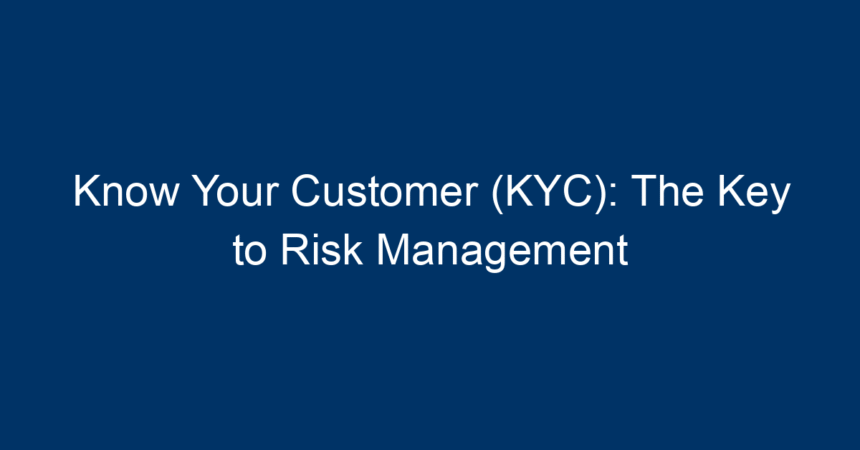In today’s fast-paced financial landscape, the importance of robust risk management cannot be overstated. One of the most effective tools in a business’s arsenal is the practice of Know Your Customer (KYC). While it may sound like a mere compliance obligation, KYC is actually a pivotal strategy that helps firms identify and mitigate potential risks associated with fraud, financial crime, and customer disruptions. This article delves deep into the concept of KYC, dissecting its components, importance, and implementation strategies.
Understanding Know Your Customer (KYC)
What is KYC?
Know Your Customer (KYC) refers to the process whereby businesses verify the identity of their clients. This practice is especially crucial for banks, financial institutions, and any businesses that engage in large transactions or offer financial services. KYC not only involves confirming identities but also understanding the client’s financial activities and risk profile.
The Components of KYC
KYC typically consists of three main components:
-
Customer Identification Program (CIP):
- This is the initial step where the business collects personal information from clients, including name, address, and social security number. Advanced techniques like biometric verification may also be incorporated to enhance security measures.
-
Customer Due Diligence (CDD):
- This involves assessing the risk profile of the customer. CDD helps businesses determine the necessary level of risk assessment required for each client. Higher-risk clients may undergo enhanced due diligence (EDD).
- Ongoing Monitoring:
- Once the customers are onboarded, their transactions must be monitored continuously. This enables businesses to detect any unusual or suspicious activity that may indicate fraud or money laundering.
The Importance of KYC in Risk Management
Mitigating Financial Crime
One of the primary reasons organizations implement Know Your Customer (KYC) procedures is to combat financial crimes such as money laundering and fraud. By thoroughly verifying customer identities and understanding their financial habits, businesses can reduce their vulnerability to such illegal activities.
Regulatory Compliance
Compliance with local and international regulations is crucial for businesses. Regulatory bodies have laid down strict guidelines for KYC processes, especially in the banking sector. Failing to comply can lead to severe penalties, including hefty fines, loss of licenses, and reputational damage. By actively engaging in KYC practices, companies ensure they abide by these regulations.
Enhancing Customer Trust
In today’s digital age, consumers prioritize their security and privacy. A company that demonstrates a strong commitment to KYC and risk management fosters better relationships with its customers. This trust not only leads to customer loyalty but can also enhance a company’s reputation in the marketplace.
Tailoring Services
Understanding customers thoroughly through KYC allows businesses to offer more personalized services. When you know your customer better, you can tailor products and services that meet their unique needs and preferences, thereby enhancing overall customer satisfaction.
Implementation of KYC Strategies
Developing a KYC Policy
Creating a comprehensive KYC policy is the first step towards effective implementation. This policy should detail the processes, responsibilities, and standards required to conduct KYC checks. Specific elements to include are risk assessment criteria, documentation requirements, and procedures for handling exceptions.
Training Employees
Staff awareness and training are crucial for the successful implementation of KYC. Employees should be trained on the importance of KYC, how to conduct customer verifications, and recognize red flags for suspicious activities. Regular training sessions can help keep the staff updated on regulatory changes and industry best practices.
Leveraging Technology
With advancements in technology, conducting KYC checks has become more efficient. Businesses can leverage artificial intelligence (AI), machine learning, and big data analytics to streamline their KYC processes. Automated systems can quickly verify identities, analyze customer behaviors, and flag potential risks, making the KYC process more effective.
Regular Audits and Monitoring
Continuous improvement is key. Regular audits of KYC processes can help identify areas of weakness and ensure adherence to policies. By monitoring changes in customer behavior or regulatory updates, organizations can adjust their KYC practices accordingly.
Challenges in KYC Implementation
High Costs
Implementing a robust KYC process can be financially burdensome for smaller businesses. With the resources required for technology upgrades and staff training, many businesses struggle to maintain stringent KYC measures.
Evolving Regulations
The regulatory landscape surrounding KYC is complex and continually evolving. Organizations must stay informed to adapt their processes in compliance with new laws, which can be daunting.
Data Privacy Concerns
As KYC involves collecting extensive personal information from clients, businesses must prioritize data security and comply with privacy regulations. Striking a balance between thorough KYC processes and safeguarding customer data is essential.
Actionable Insights for Businesses
-
Invest in Technology: Leverage modern technology to automate KYC processes, thereby enhancing speed and accuracy. Look for software solutions that integrate identity verification, transaction monitoring, and risk assessment.
-
Develop a Compliance Culture: Foster a culture of compliance within the organization. Ensure that all employees understand the significance of KYC and their roles in maintaining a secure environment.
-
Stay Updated: Subscribe to relevant industry publications and participate in training sessions to keep abreast of changes in KYC regulations and best practices.
-
Customer Communication: Clearly communicate your KYC processes to customers. Transparency regarding data handling will alleviate concerns and build trust.
- Tailored Risk Approaches: Implement risk-based approaches in your KYC processes. Different customer profiles should have proportionate KYC measures in place.
Conclusion
In conclusion, Know Your Customer (KYC) is more than just a regulatory requirement; it’s an essential element of effective risk management that can significantly impact a business’s success. By investing in robust KYC strategies, organizations can mitigate risks, foster customer trust, and enhance their overall reputation. As the digital landscape continues to evolve, so too must KYC practices, ensuring they remain effective, efficient, and compliant. By correctly implementing KYC processes, businesses are not only securing their operations but are also paving the way for sustainable growth in an increasingly competitive market.




